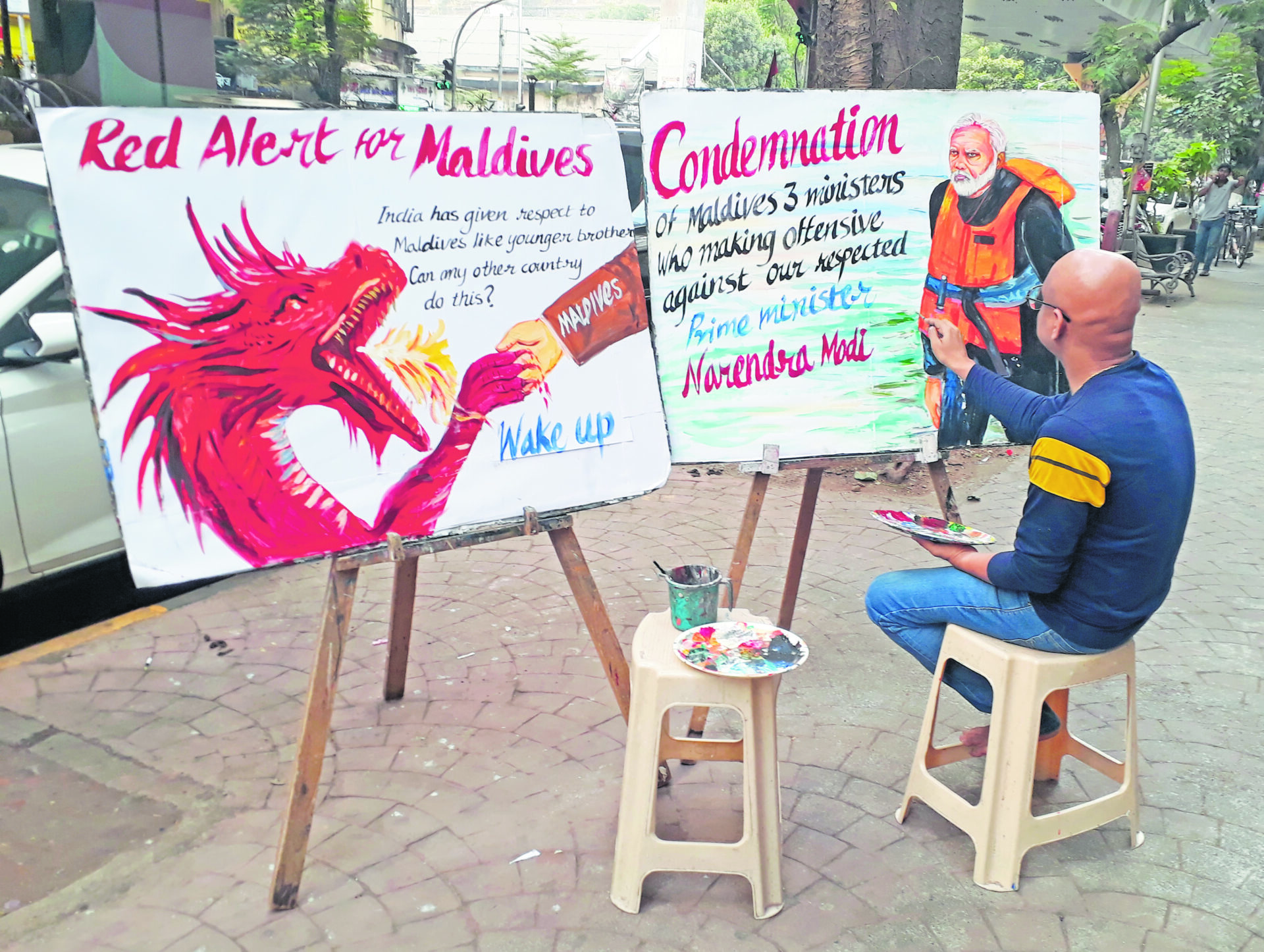All the smaller countries around us who have been the generous recipients of our aid have failed to honour our crucial security concerns vis-à-vis China.
In an exhibition of misplaced, crude and delusionary machismo and in terminology that smacks of street-side slang rather than diplomatic parley, President Mohamed Muizzu of the Maldives on his return from China angrily remarked: “We may be small but that doesn’t give you the licence to bully us.”
However, this David and Goliath scenario that President Muizzu presents has a mammoth-sized flaw. In this case, it is David who has raked up the fight and is deceptively shifting the blame onto India to gain sympathy by faking
Let us recapitulate the sequence of events of the current India-Maldives spat to remind President Muizzu where the fault lies. A harmless, innocent picture of Prime Minister Narendra Modi strolling along the pristine beach of the Indian island of Lakshadweep resulted in three junior ministers of his government indulging in a barrage of profanities ridiculing our PM as a “clown” and referring to our country as “cowdung.”
Maldives, known globally as an exotic holiday destination, is an archipelago of around 1,200 islands located in the Indian Ocean to the southwest of mainland India. Close to the Maldives, about 750 km away lie the Indian island of Lakshadweep, a smaller group of islands that share the same ecosystem as the Maldives—similar beaches, fauna and flora. In PM Modi’s sojourn in Lakshadweep, the Maldivians saw a red flag: an attempt to promote Lakshadweep as a competition to the Maldives, hence the uncouth backlash.
Maldives, a country of about 500,000 people, was a British protectorate till it became independent in 1965. Since then, India has fostered close ties and been intimately associated with the development of the Maldives; an aid that surpasses plain monetary support and includes assistance in medical needs, education, security concerns and infrastructure development.
The Maldives has been a regular recipient of increasing Indian grant money: from Rs 109 crore in 2018 to Rs 400 crore in the current fiscal year, an amount approximately around 1.5% of Maldives’ budget.
India is actively involved in building several airports, developing seaports and expanding its tourism infrastructure to previously untouched islands. An important Indian undertaking is the Greater Male Connectivity Project, a 6.74 km-long bridge that connects the Maldivian capital Male with three adjoining islands and costs US$500 million.
The Indira Gandhi Memorial Hospital (IGMH), one of the four hospitals in the country, was built with Indian help in 1995. In 2017, major renovations were made to the hospital with Indian aid amounting to Rs 52 crore. Additionally, Maldivians can freely travel to India for medical treatment at an affordable cost; in 2021, 22,798 Maldivians travelled to India for medical treatment.
More important than these peace-time initiatives is the help that India has rendered at critical times. It was India that came to the rescue in 1988 when a group of Sri Lankan-based mercenaries attempted a coup to overthrow the Maldivian government. And in 2004, when a massive tsunami struck the Maldives, it was India that was the first responder. Again in 2014, when a drinking water crisis hit Male the capital, it was India that rushed cartons of drinking water to the Maldives both by air and sea.
During the Covid pandemic, Maldives was the first country to receive a generous supply of Covid vaccines from India.
India has played an important role in training the Maldives National Defence Force (MNDF) but no combat troops are stationed in the Maldives today. The hue and cry raised by President Muizzu is about a paltry 88 Indian military personnel who are there primarily to help in reconnaissance and in medical rescue operations. This entire controversy is nothing but a ruse for President Muizzu to further the Chinese agenda in the Indian Ocean.
At this juncture the Maldives stands out as an epitome of ingratitude.
The rise of religious radicalism in the Maldives is another important factor in this anti-India calculus. While Islam in the Maldives has always been moderate, recent times have seen a dangerous ideological shift attributed to Pakistan-educated returnees. The former President Maumoon Abdul Gayoom once said: “They go to Pakistan, study in madrasas and come back with extreme religious ideas.”
Maldives has the infamous distinction of being the largest contributor per capita of extremists (about 250 individuals) to the Islamic State.
Vandalism of artefacts related to the Maldives’ ancient non-Islamic history, attacks on foreigners like the 2007 Sultan Park bombing, prohibition of the celebration of Christmas and the disruption of Yoga Day sponsored by India are all examples of this new, spreading radicalism.
For all his talk about sovereignty and independence, President Muizzu is taking the Maldives down a slippery path of economic doom and bondage. By further increasing the debt to China, President Muizzu has in effect bartered away Maldivian independence for temporary economic gain. He has walked into a debt trap just like Sri Lanka and Pakistan did in the past—both recipients of so-called Chinese aid that proved to be their death knell. The Maldivian people must be wary of such leaders.
India has invested a lot in the Maldives and the countries have a lot at stake. India must try to salvage the relationship as far as possible by pragmatic dialogue. However, as Chinese “research” vessels (probably spy ships) steam towards the Maldives to dock there, India needs to do a rethink on its Neighborhood First policy. All the smaller countries around us who have been the generous recipients of our aid like Sri Lanka, Bhutan and even Bangladesh have failed to honour our crucial security concerns vis-à-vis China. Have we been too trusting and as a result basically ineffective in safeguarding our security interests? Should our neighbourhood policy be more conditional and have more teeth?
We cannot be the neighbourhood bully but neither can be we be taken for a ride each time.

